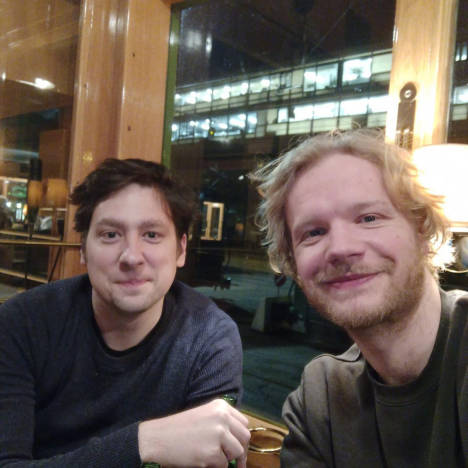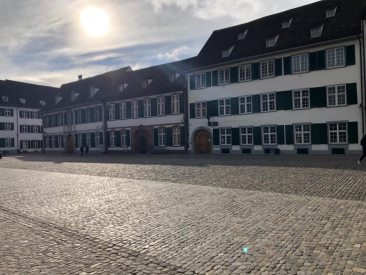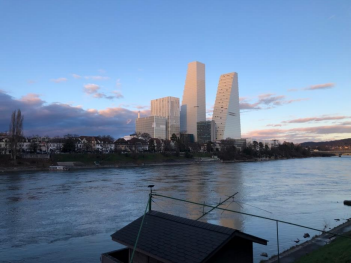michael bennett
PhD candidate, Department of Hispanic Languages and Literature
Guiliano Fellow, Fall 2022
 Art After Fascism: The Musical Poetics of Luciano Berio
Art After Fascism: The Musical Poetics of Luciano Berio
The support of the Edward Guiliano Global fellowship enabled me to spend a week in Basel, Switzerland, where I accomplished dissertation research at the Paul Sacher Stiftung on Italian musical modernism after Fascism. My dissertation is on the Italian composer Luciano Berio, the avant-garde writers who comprised his intellectual milieu, and how the legacy of Fascism left grooves in their respective aesthetics and approaches to modernist artistic expression. The Sacher archive is home to hundreds of documents which, taken altogether, trace the evolution of European musical modernism since the beginning of the twentieth century. This breadth of items includes the Luciano Berio collection, with all the composer’s scores and correspondences, and thus a dedicated trip to the Sacher is something I have been eagerly anticipating ever since I began formulating my dissertation project.
 Despite its central place in musicology as a research site for twentieth-century
composition, the Sacher archive as a physical location is very easy to miss. The front
door is tucked away in the corner of the Münsterplatz and overshadowed by the imposing
medieval cathedral at the heart of the compact Old Town square. While the interior
of the archive itself is refreshingly modern, the daily schedule felt appropriate
to the monastic life evoked by the cathedral and the surrounding buildings in Fachwerkhaus-style
trim: doors open promptly at 9am and lock once more within five minutes; the 11:45am
bell alerts researchers to the time so that the building can be cleared for noontime
lunch; doors reopen at 1pm and another bell sounds at 4:45pm, reminding anyone still
working that the 5pm closing time is fast approaching. I spent as much time as allowed
at the Sacher Stiftung, beginning with the dozens of Berio scores I had requested
ahead of time but ultimately dedicating the bulk of my stay to his correspondences.
I read through countless letters, including a handful from Italo Calvino and Umberto
Eco and literally hundreds from the experimental writer and poet Edoardo Sanguineti;
I was also able to look through letters addressed to Berio from other members of
the Italian literary avant-garde like Amelia Rosselli. These led to their own respective
rabbit holes: correspondences between Berio and the French philosopher Gilles Deleuze,
as well as other references and points of contact that will lead to completely new
threads in my research project and, likely, my professional career. Though the hours
of operation were limited, I walked back to the hostel each day somehow both mentally
drained yet simmering with new possible research directions for fortifying my dissertation.
Despite its central place in musicology as a research site for twentieth-century
composition, the Sacher archive as a physical location is very easy to miss. The front
door is tucked away in the corner of the Münsterplatz and overshadowed by the imposing
medieval cathedral at the heart of the compact Old Town square. While the interior
of the archive itself is refreshingly modern, the daily schedule felt appropriate
to the monastic life evoked by the cathedral and the surrounding buildings in Fachwerkhaus-style
trim: doors open promptly at 9am and lock once more within five minutes; the 11:45am
bell alerts researchers to the time so that the building can be cleared for noontime
lunch; doors reopen at 1pm and another bell sounds at 4:45pm, reminding anyone still
working that the 5pm closing time is fast approaching. I spent as much time as allowed
at the Sacher Stiftung, beginning with the dozens of Berio scores I had requested
ahead of time but ultimately dedicating the bulk of my stay to his correspondences.
I read through countless letters, including a handful from Italo Calvino and Umberto
Eco and literally hundreds from the experimental writer and poet Edoardo Sanguineti;
I was also able to look through letters addressed to Berio from other members of
the Italian literary avant-garde like Amelia Rosselli. These led to their own respective
rabbit holes: correspondences between Berio and the French philosopher Gilles Deleuze,
as well as other references and points of contact that will lead to completely new
threads in my research project and, likely, my professional career. Though the hours
of operation were limited, I walked back to the hostel each day somehow both mentally
drained yet simmering with new possible research directions for fortifying my dissertation.
While working in the archive, I was also afforded the opportunity to connect with other important scholars in my field with interests directly related to my own. One of the head scientific researchers of the Sacher and a Berio scholar in her own right, Angela Ida de Benedictis, helped guide me through the mountains of Berio-related reels and gave me access to materials not yet transferred to microfilm. I was also able to attend an institutional colloquium on Berio delivered by a fellow researcher, another junior scholar with whom I have kept in communication since my return. Besides this, I was positioned to connect with researchers from Germany, Italy, and the U.K. making research daytrips to Basel. Many of the most active Berio scholars and researchers in musical modernism more generally operate out of Western Europe, and my physical presence at the Sacher allowed me to network in a way that would not have been possible from my position in the United States.
 My time in Basel not spent in the archive was devoted to exploring the city. Despite
the freezing temperatures, I spent several hours each evening walking through the
Old Town and nearby neighborhoods absorbing the cultural landscape (and looking for
dinner). While the architecture of Basel maintains a medieval aesthetic, the city
is also a haven for modern art museums, and I dedicated much of my free time to viewing
works that often felt like intellectual siblings to the music that serves as the
basis of my research. The major city-wide Museumsnacht, structured like a pub crawl but with stops at museums instead of bars, was serendipitously
scheduled for the weekend before my departure, and my dear friend from southern Germany
made the trip south to join me for the event. We shared a beer in the tram museum,
looked at technology-based exhibits at the HEK, and inadvertently became participants
in an interactive theater piece staged at a functioning mill and held entirely in
Baseldytsch – a dialect of German that neither of us could fully understand.
My time in Basel not spent in the archive was devoted to exploring the city. Despite
the freezing temperatures, I spent several hours each evening walking through the
Old Town and nearby neighborhoods absorbing the cultural landscape (and looking for
dinner). While the architecture of Basel maintains a medieval aesthetic, the city
is also a haven for modern art museums, and I dedicated much of my free time to viewing
works that often felt like intellectual siblings to the music that serves as the
basis of my research. The major city-wide Museumsnacht, structured like a pub crawl but with stops at museums instead of bars, was serendipitously
scheduled for the weekend before my departure, and my dear friend from southern Germany
made the trip south to join me for the event. We shared a beer in the tram museum,
looked at technology-based exhibits at the HEK, and inadvertently became participants
in an interactive theater piece staged at a functioning mill and held entirely in
Baseldytsch – a dialect of German that neither of us could fully understand.
Overall my brief stay in Basel was nothing short of incredible, both in terms of the research I was able to accomplish and the experience I had as someone visiting an unfamiliar country. The experience has certainly been the most cosmopolitan of my life: between reading through letters in Italian and English at the archive, reviving my rusty German for interactions within the rest of the city, and practicing my extremely green French in and around the Geneva airport, my brain felt constantly on the verge of linguistic collapse. This trip is already leaving deep traces in my work and in my ambitions as a cultural ambassador, and it will continue to play an important role both in the completion of my dissertation and the professional career that follows. My deepest thanks go out to Pascal Schiemann for a friendly face during the trip, Judy Lochhead for her mentorship and help with the application, and of course the Guilianos and the Stony Brook Foundation for gifting me the opportunity to make this memorable and productive trip happen in the first place.
The Guiliano Global Fellowship Program offers students the opportunity to carry out
research, creative expression and cultural activities for personal development through
traveling outside of their comfort zone.
GRADUATE STUDENT APPLICATION INFORMATION
UNDERGRADUATE STUDENT APPLICATION INFORMATION
Application Deadlines:
Fall deadline: October 1 (Projects will take place during the Winter Session or spring semester)
Spring deadline: March 1 (Projects will take place during the Summer Session or fall semester)
Please submit any questions here.
